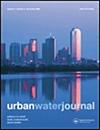A transdisciplinary approach for assessing the potential feasibility of Sustainable Urban Drainage Systems: case study, Bogotá, Colombia
IF 1.6
3区 环境科学与生态学
Q3 WATER RESOURCES
引用次数: 0
Abstract
ABSTRACT Rapid population growth and urban sprawl have expanded built-up areas, affecting flood patterns in cities. Sustainable urban drainage systems (SUDS) have gained significant attention by attempting to replicate natural pre-development drainage conditions. This paper presents a new transdisciplinary methodology for assessing the potential feasibility of 12 different SUDS typologies by considering physical restrictions and six types of contextual barriers. The approach integrates input from academic and non-academic actors, fuzzy logic, geographic information system tools, and multi-criteria decision analysis. A neighborhood in Bogotá, Colombia, was selected as the unit of analysis, framing a relevant case study for highly urbanized areas. The findings demonstrate the differential impact of local context constraints and emphasize the importance of comprehensive approaches to SUDS planning that consider criteria other than technical. The methodology is a tool to support architects, engineers, urban planners, and urban water decision-makers in the planning of sustainable and flood-resilient cities.评估可持续城市排水系统潜在可行性的跨学科方法:案例研究,哥伦比亚波哥大
人口的快速增长和城市的蔓延扩大了建成区,影响了城市的洪水模式。可持续城市排水系统(SUDS)通过尝试复制自然的开发前排水条件而获得了极大的关注。本文提出了一种新的跨学科方法,通过考虑物理限制和六种类型的环境障碍来评估12种不同SUDS类型的潜在可行性。该方法集成了来自学术和非学术参与者、模糊逻辑、地理信息系统工具和多标准决策分析的输入。哥伦比亚波哥大的一个社区被选为分析单元,为高度城市化地区构建了一个相关的案例研究。研究结果显示了当地环境限制的不同影响,并强调了考虑技术以外标准的综合方法对sud规划的重要性。该方法是支持建筑师、工程师、城市规划者和城市水决策者规划可持续和抗洪城市的工具。
本文章由计算机程序翻译,如有差异,请以英文原文为准。
求助全文
约1分钟内获得全文
求助全文
来源期刊

Urban Water Journal
WATER RESOURCES-
CiteScore
4.40
自引率
11.10%
发文量
101
审稿时长
3 months
期刊介绍:
Urban Water Journal provides a forum for the research and professional communities dealing with water systems in the urban environment, directly contributing to the furtherance of sustainable development. Particular emphasis is placed on the analysis of interrelationships and interactions between the individual water systems, urban water bodies and the wider environment. The Journal encourages the adoption of an integrated approach, and system''s thinking to solve the numerous problems associated with sustainable urban water management.
Urban Water Journal focuses on the water-related infrastructure in the city: namely potable water supply, treatment and distribution; wastewater collection, treatment and management, and environmental return; storm drainage and urban flood management. Specific topics of interest include:
network design, optimisation, management, operation and rehabilitation;
novel treatment processes for water and wastewater, resource recovery, treatment plant design and optimisation as well as treatment plants as part of the integrated urban water system;
demand management and water efficiency, water recycling and source control;
stormwater management, urban flood risk quantification and management;
monitoring, utilisation and management of urban water bodies including groundwater;
water-sensitive planning and design (including analysis of interactions of the urban water cycle with city planning and green infrastructure);
resilience of the urban water system, long term scenarios to manage uncertainty, system stress testing;
data needs, smart metering and sensors, advanced data analytics for knowledge discovery, quantification and management of uncertainty, smart technologies for urban water systems;
decision-support and informatic tools;...
 求助内容:
求助内容: 应助结果提醒方式:
应助结果提醒方式:


